CS GAMES Camp Embraces Creativity in High School Girls Through Computer Science
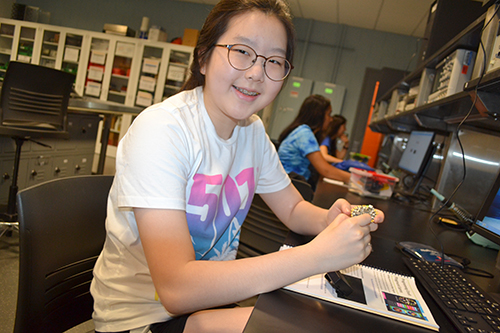
A CS GAMES camper uses Circuit Playground creatively.
July 25, 2018
Computer Science is a lot more than just sitting in front of a computer and coding. This is what 19 high school girls from Illinois and beyond discovered when they participated in the Computer Science (CS) GAMES (Girls' Adventures in Mathematics, Engineering, and Science) camp from July 8–14, 2018. Sponsored by both Computer Engineering and Computer Science, the camp, according to Co-Coordinator Dot (Dorothy) Silverman, didn't just emphasize software and hardware, but it encouraged creativity.
“It's software, because our world is run by software now, and it's not just CS. It's CS + X. Scratch block coding is a great way to get people into coding because it's intuitive, much more intuitive than the way I learned. So we're teaching people coding because it's becoming, for instance, as necessary as writing. We're teaching hardware because you need to know how your software is going to affect the world.”
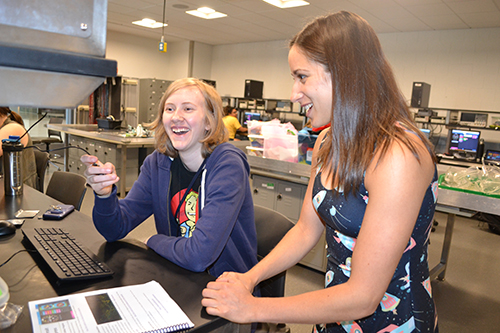
Dot Silverman (right) helps out a CS GAMES camper with her LED lights.
So the girls were introduced to some basic computer programming, using several applications, such as Scratch, App Inventor, and Circuit Playground. They were also introduced to some of the basics of a computer, a circuit board or motherboard— as they learned how to solder, then made copper tape circuits. “We've got hardware like textiles, Silverman adds. “Tangible, right?”
Regarding the last camp emphasis, creativity, Silverman clarifies, “Because we can't innovate unless we have creativity. That's why we're tinkering. That's why we're having fun. That's why we're doing these unusual kind of activities that you don't necessarily see in standard courses.”
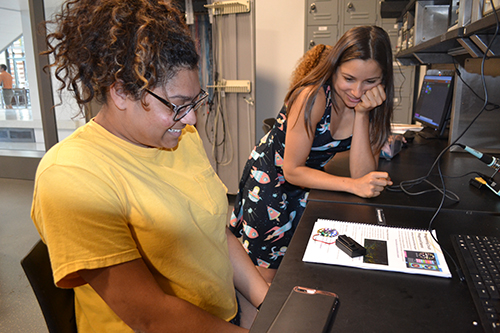
Dot Silverman (right) and a camper get excited when her LED lights light up.
Encompassing all that the participants had learned or experienced during the week was the main focus of the week: a capstone project. Free to design a final project of their own choosing, the girls exhibited a great deal of creativity, with projects ranging from a night light, to e-textiles (a light-up bag, hat, or stuffed animal; to purely electronic, such as a websites. One girl, who reported that she couldn’t “think of a project,” created what she called “The endlessly pointless game.”
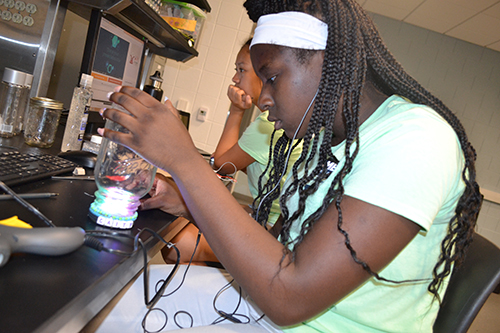
A CS GAMES camper making her final project: a night light.
Regarding the capstone project, Silverman says, “They can choose that, so they'll have to learn how to design, and they'll have to understand how to integrate code with an actual project that does something. I think that's what a lot of kids don't get to do in school, and that's what they get to do here and they get to do that because we have the resources too. The issue with a lot of schools is they don't have the money to actually invest in good hardware, so that's what we can do here.”
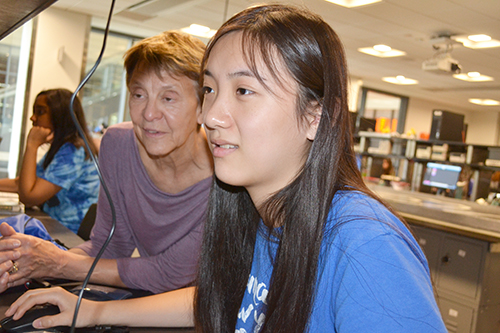
Jana Sebestik (left) looks on as a CS GAMES camper learns to use the Circuit Playground application.
So what are some additional benefits of bringing high school girls onto campus like this? Jana Sebestik, the Assistant Director of STEM Curriculum Design in the College of Education and CS GAMES Camp Co-Coordinator, indicates that it exposes them to the campus:
“It gives them a chance to see our campus at some kind of extended visit rather than like a half day or high school visit, and allows them to see what the various fields of engineering offer. It lets them do stuff, meet people from other places, stay in the dorm.”
Her fellow Co-Coordinator, Silverman, adds that the camp is extremely beneficial because it helps participants understand that they can do CS and that, yes, there’s a place for them in the field.
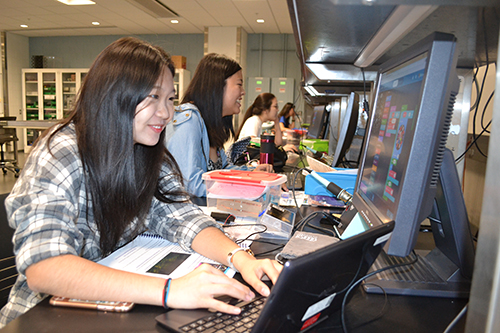
CS GAMES campers work on coding their LEDs on the computer.
“It's immense,” says Silverman regarding the camp’s benefit for high schoolers. “It's so immense. I would say it's actually less about learning hard skills, because there's only so much that you can do in a week, but it's really about developing an identity.”
She goes on to explain that activities like the camp are about creating good social-emotional experiences. “So it's kind of like if you have a good experience doing something, you'll want to keep doing it.”
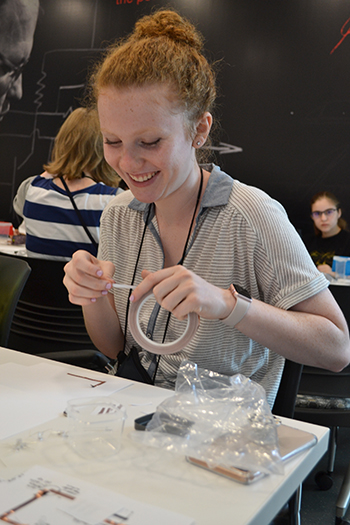
A CS GAMES camper works on her copper tape circuit.
She clarifies that sometimes students, especially girls, often have bad social-emotional experiences with math, because it's hard. Plus, the way it’s taught, if a youngster fails once, they feel like, personally, they are a failure. “And no one wants to feel like a failure; no one wants to feel embarrassed,” she admits. So very early on, because girls have had bad social-emotional experiences, they tell themselves, “Oh, I'm not good.” And based on these experiences, society ingrains into girls: “Oh, you don't look this way. You're not supposed to be this person. You're not welcomed here.”
“So what I'm saying is that these social-emotional experiences early in life develop an identity,” Silverman continues, “and a lot of people create a personal narrative that they follow for life based on this identity. We want to change girls' identities. We want to say to them, 'You are welcome here. You're supposed to be here. This is for you!’ and it is.”
Silverman reports doing the CS GAMES camp because last summer, she helped with two other GAMES camps, which she reports were “super fun. It was the highlight of my summer, and I was like, 'I have to help again!'”
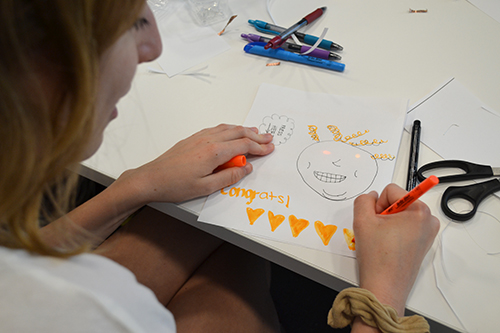
A CS GAMES camper shows off her card she made that lights up when you press a button.
So when Sebestik sent out an email searching for a co-coordinator for this camp, she reports, “I was like, 'Oh my God, totally!' I've always had a passion for outreach and women in science.”
In fact, she thinks there aren't enough female science teachers, so that's her goal. “The more experience I can get teaching, the better at it I will be,” she says.
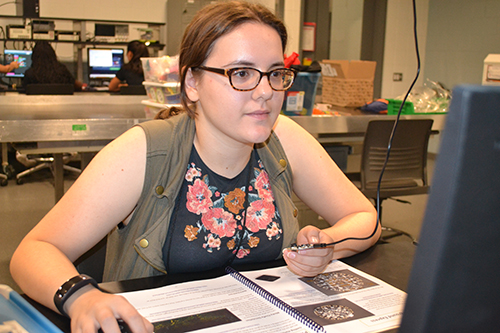
A CS GAMES camper works on coding her LED lights.
Silverman is the perfect person to serve as a role model for girls, demonstrating that they too can do STEM. She did her undergraduate work in physics with an emphasis in engineering; she worked at AutoDesk; she did bioengineering at another company; then she came here to Illinois, originally in Materials Engineering. “And then I realized, I don't like sitting alone in front of a computer, she admits. “I love talking to people, so I was like, 'Maybe I should be a teacher!'”
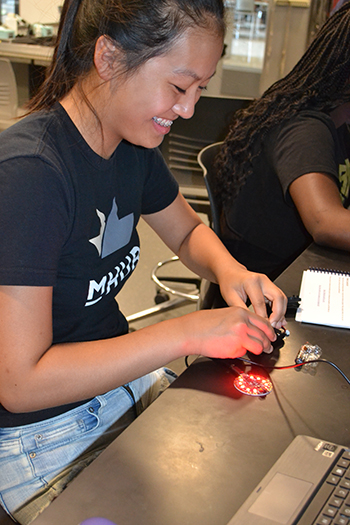
Sophia Zhuang working on her LED lights.
So, because she’s so passionate about teaching, she’s back in school, working on a Master’s in Curriculum and Instruction at Illinois.
Regarding Silverman's goal of showing participants that CS is more than just coding—one camperk Sophia Zhuang, affirms that this was the exact impact the camp had on her. Arising sophomore at Stevenson High School hear Chicago. Zhuang, shares why she came to the camp and its impact on her.
Zhuang was honest about why she came to the CS camp this summer: her parents told her to, but she admits to being really interested in the subject. She says her parents have always assumed that computer programming is literally just for the job.
“But then, when I started experimenting on my own,” she confesses, “I started realizing you could make your own creations, and it's a lot more than just the job. It's more like being able to create anything that you want to and being able to change something and make it better. I learned a lot from the camp, and it's been really fun so far.
So does she think she might go into computer science? Yes.
“After taking this camp, she concedes, “I realize it's a lot more than coding and typing on a computer all day. I've learned that it takes a lot more than that, and you can incorporate a lot of different products. You can even make bracelets or just create your own interests and make something you actually enjoy.”
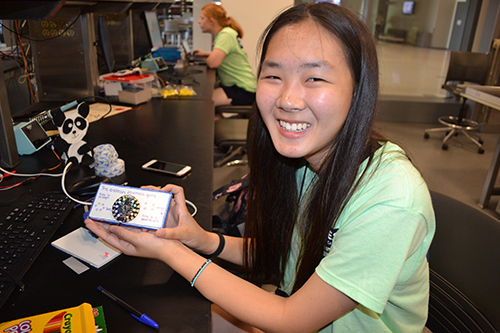
A CS GAMES camper shows off the LED game she made.
However, it wasn’t just the students who benefitted. Sebestik says the different camps benefit the greater campus as well. For example, they give folks in the various disciplines practice bringing their research down to a level younger students can understand.
“There's a lot of development, not just this camp, but all of the camps where there's a lot of curriculum development, a lot of thinking about how to portray the work that the researchers or the professors or the engineers do in a way that's meaningful and valuable for high school kids and their families.
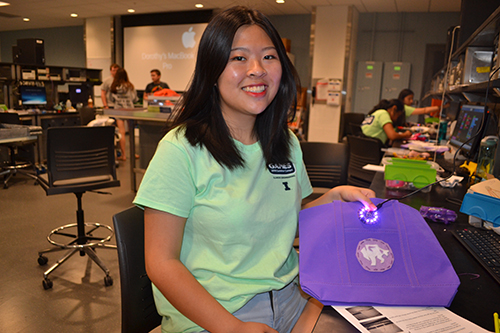
A camper works on making her light-up bag.
Did Sebestik you see any engineers among the group of campers? “You know, I do,” she affirms. “It's a little early to tell, but I see some good engineer-like problem-solving skills, attention to detail, the ability to try again if it doesn't work the first time.”
Story and photographs by: Elizabeth Innes, Communications Specialist, I-STEM Education Initiative.
More: 8-12 Outreach, Computer Science, GAMES, Summer Camp, Women in STEM, 2018
For additional I-STEM articles about GAMES camps, please see:
- Aerospace Engineering Camps Seek to Ignite High Schoolers’ Interest in Aerospace, STEM
- ChBE GAMES Camp Introduces High School Girls to Chemical and Molecular Engineering
- GLEE GAMES Camp Seeks to Spark High School Girls' Interest in Electrical Engineering
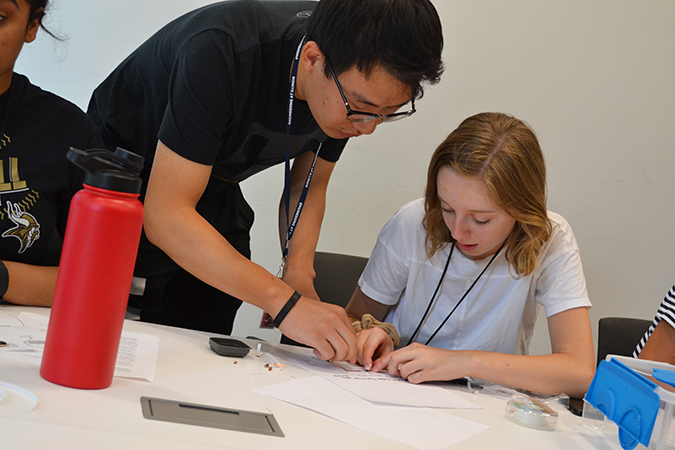
A CS student (left) assists a camper with her copper tape circuit.













.jpg)
















